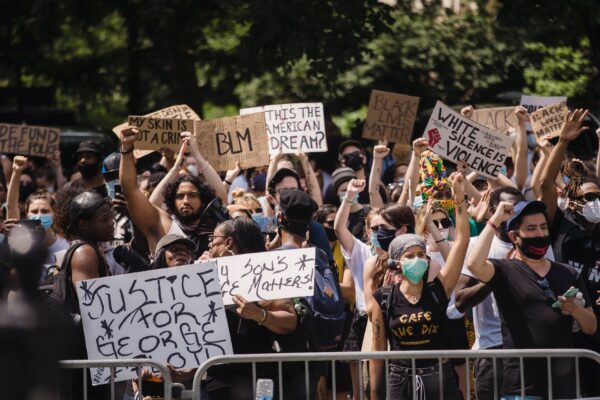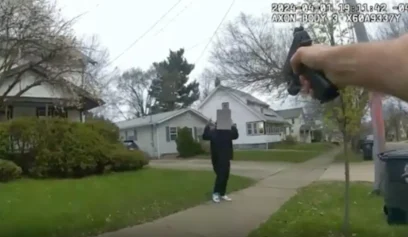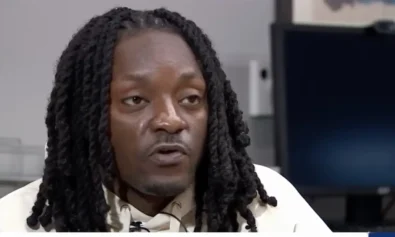An Black Oregon woman who was injured by police during a demonstration protesting the murder of George Floyd in 2020, has won her civil rights lawsuit against the city of Salem and its police department.
After going to trial, a jury decided she is entitled to a seven-figure payout after her constitutional rights were violated.

On Friday, Sept. 30, a federal jury unanimously ruled in Eleaqia McCrae’s favor, saying her lawyer Kevin Brague adequately proved that Officer Robert Johnston violated her “Fourth Amendment right not to be subjected to excessive force” on May 31, 2020, when he shot her twice with rubber bullets, once in the eye and another time in the chest, according to the Statesman Journal.
As a result of being shot, McCrae states she now has permanent vision loss and an injury to her chest. Doctors also diagnosed her with retinal hemorrhage, macular hole, and vitreous hemorrhage after the incident, disabilities that her team argued changed her life.
A verdict document stated the protester was awarded by the jury $250,000 in economic loss and $800,000 in non-economic loss after a weeklong trial, the Salem Reported stated.
Brague stated, “My client, Ms. Eleaqia McCrae, is very grateful for the jury and their recognition and validation of the facts and circumstances of this case.”
While they were in agreement about the excessive force, the jury said her team did not prove with a “preponderance of the evidence” that the cop violated her First Amendment right to lawful assembly, nor that he committed an act of battery against her during the altercation.
Despite Johnston shooting McCrae, his act did not register as battery in the state. According to law, battery is “the voluntary unlawful physical touching of another which causes intentional harm or physical offense to that person.”
The jury did not believe Brague proved Johnston intentionally caused harm to the victim as suggested in the August 2020 lawsuit.
U.S. District Judge Michael J. McShane dismissed some of McCrae’s counts earlier in the year.
Courtney Knox Busch, the city’s strategic initiatives manager, said, “We appreciate the jury’s work on this case and respect their verdict. Because there is an ongoing legal argument and the case has not yet concluded, we cannot offer further comment at this time.”
Knox Busch also was shocked at what she considered a historic award, saying she is not aware of another civil case where the plaintiff was awarded $1 million or more in damages.
On the day of the incident, McCrae and others marched on the Capitol into downtown Salem.
As the night came to a close, the peaceful protesters were joined by rabble-rousers who started causing chaos in the crowd, according to the lawsuit. These additional people began to throw objects into the crowd and after a while the once peaceful demonstration was engaged by mobilized members of the Salem Police Department, uniformed in “full militarized gear.”
The officers were accompanied by a SWAT team and an armored vehicle.
When confronted by the officers, the complaint said McCrae, her sister, and her friend linked their arms together and silently knelt in front of the demonstrators.
“When the march was stopped by SPD there was no rioting, looting, or destruction of public and private property. There was no violence prior to the SPD show of force. It was a peaceful assembly. The marchers, including Elea McCrae, linked arms, and silently knelt in the street. The marchers and Elea McCrae then stood up,” the suit said.
Their act was met with a volley of rubber bullets.
In her federal lawsuit, she said Johnston shot at her and other demonstrators using “stinger” or “skip” rounds from his 40mm launcher.
Salem officials dismissed her account and said McCrae was injured by other protesters or people from the crowd, and not by officers. In fact, the city’s lawyers Gerald Warren and Jennifer Gaddis argued McCrae’s injuries were due to her own “negligent conduct by failing to disperse the area when the protests were no longer peaceful.”
During the 2020 summer of unrest, officers over a dozen people in Salem during protests and marches. Many of the charges were for vandalism, rioting, disorderly conduct, trespassing, or interfering with officers. Many of those charges were dismissed after Deputy District Attorney Amy Queen said there was not enough evidence to prosecute those defendants.


